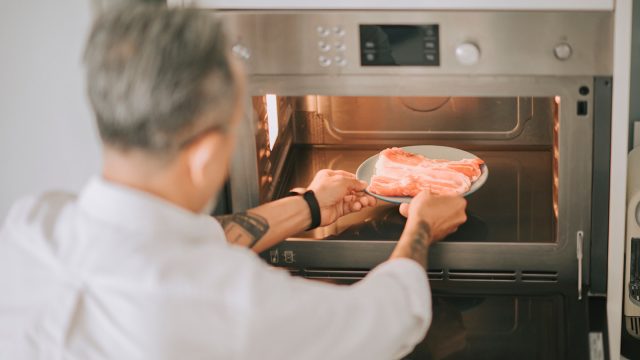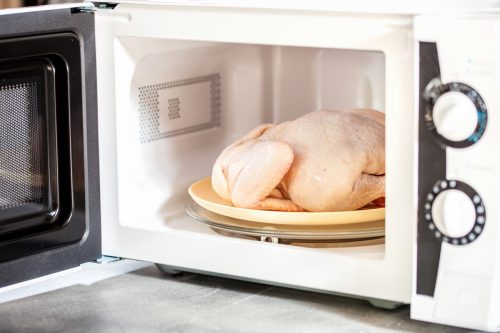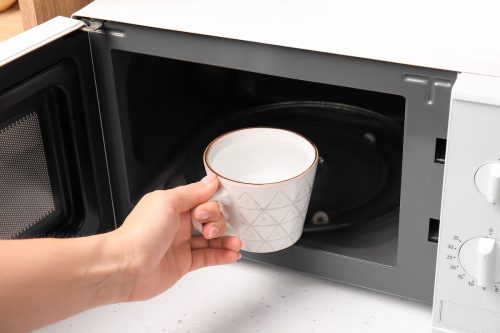The 6 Most Dangerous Foods to Put in the Microwave, Experts Say

The microwave is amazing for cooking and reheating all types of food quickly and easily, whether you’re making popcorn or warming up last night’s leftovers. But as incredible a workhorse as this appliance is, it’s not something we can use for all the food in our kitchen. In fact, in some cases, it can be downright dangerous to use this method of cooking. Keep reading to hear from experts about the foods you should never microwave.
READ THIS NEXT: 5 Items You Should Never Store in Your Pantry, According to Experts.
6 Foods You Should Never Microwave
1. Eggs in the Shell

We all know that poaching eggs can be a pain, so for the past few years, there have been countless TikTok videos sharing how to do so in the microwave.
But Melissa Wasserman Baker, a dietitian, nutritionist, and founder of Food Queries, says this is a big safety risk. “Microwaving eggs in their shells can cause them to explode, which can lead to serious burns and injuries.”
In a YouTube video debunking fake social media hacks, Ann Reardon, founder of How to Cook That, shares several accounts of people who were severely burned after microwaving eggs. It’s especially dangerous for poached eggs “because it can shoot that hot water all over you,” she notes.
2. Raw Hot Peppers

Lisa Richards, a nutritionist and creator of The Candida Diet, explains that hot peppers get their spicy flavor from the compound capsaicin—which gets released if they’re microwaved raw.
Capsaicin can irritate the eyes, nose, and throat, leading to coughing and difficulty breathing. Additionally, the steam generated from heating peppers in the microwave can also cause burns to the skin and eyes.
READ THIS NEXT: Never Put Meat in the Fridge Without Doing This First, CDC Warns.
3. Processed Meat

Processed meats such as bacon, sausage, and hot dogs should not be microwaved.
“They contain high levels of preservatives and nitrates, which can react with the microwave radiation and produce harmful compounds,” says Wasserman Baker.
According to a 2015 research paper published in Lipids in Health and Disease, when processed meats were heated in the microwave, the production of cholesterol oxidation products (COPs) increased. “Cholesterol is an important biological compound; however, its oxidation products have been proven to be harmful to human health,” the paper explains.
4. Frozen Meat

If you forgot to defrost that pack of chicken for dinner, throwing it in the microwave on the “defrost” setting may seem like a no-brainer. But putting frozen meat in the microwave can be a bad idea for a couple of reasons.
“Microwaves do not cook food evenly, and frozen meat can remain partially frozen in some areas while other areas become hot enough to promote bacterial growth,” explains Trista Best, a registered dietitian at Balance One Supplements. Bacteria can then cause foodborne illness.
And from a taste perspective, “microwaving frozen meat can also result in an unpleasant texture, with some parts becoming rubbery or tough,” Best adds.
For more health and safety advice delivered straight to your inbox, sign up for our daily newsletter.
5. Grapes

We’re not sure why you’d be microwaving grapes, but if the desire arises, do not do it.
“Putting grapes in the microwave can be dangerous because the grapes can create a plasma-like fire inside the microwave, which can damage the appliance and create a potential fire hazard,” says Richards.
As Live Science explains, scientists actually studied this phenomenon and found that it occurs because “the microwaves create ‘hotspots’ of electromagnetism.”
6. Water

It’s not uncommon to put a mug of water in the microwave if you’re making tea or hot chocolate and don’t feel like using the kettle. But in her video, Reardon explains that depending on what you’re microwaving the water in, you could be setting yourself up for a dangerous situation.
As she explains, normally when you heat water, it reaches a boiling point and starts to bubble, which is the water being turned into steam. But if your water has no impurities, say you’re using filtered or distilled water, it could explode in the microwave if you put it in “a container that is highly glazed, it has no scratches in it, like a glass or a new cup.”
It’s then possible to heat the water above its boiling point without it visibly bubbling. If you then move the container or add anything to it (think instant coffee or a tea bag), “the water instantly starts bubbling and spurts boiling water everywhere,” Reardon says.